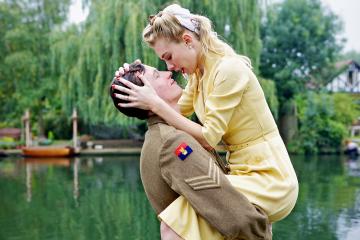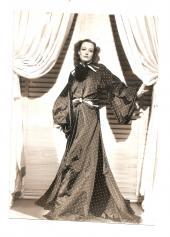'Queen and Country' charmingly captures English life in the 1950s
By Barry Paris / Pittsburgh Post-Gazette
It takes a successful Hollywood film about 15 — maybe 20 — minutes to generate a sequel. In England, the gestation period for a really good sequel of a really good film tends to be much longer — in writer-director John Boorman’s case, 28 years.
Mr. Boorman’s beautiful “Hope and Glory” (nominated for five Oscars in 1987) was the semiautobiographical tale of 9-year-old Billy’s premature coming-of-age in London during the World War II Blitz. That exhilarating time of adventure, danger and upheaval culminates in sheer joy when an errant Luftwaffe bomb blows up his school.
“Queen and Country” picks up the story a decade later when Bill (Callum Turner) is all grown up, handsome and sexy and happily swimming off his family’s private island in the Thames until unhappily drafted into the British army during the Korean War.
In boot camp, he meets up with soon-to-be-best-mate Percy (Caleb Landry Jones), a highly excitable troublemaker. They’ll join forces with cheeky rogue Redmond (Pat Shortt), a “skiver” — Scottish slang for scammer or slacker — who has been around in the military long enough to know the system:
“Everybody in the army is trying to get away with something,” Redmond teaches. “Find out what it is, and play on it.”
The result is an escalating battle of wits — and psychological war of attrition — with their prickly superiors: Sgt. Maj. Bradley (David Thewlis) keeps hauling them in for minor infractions, while aptly named Maj. Cross (Richard E. Grant), a Chris Walken look-alike, is constantly enraged that his beloved regimental clock (a gift from Queen Victoria) keeps getting stolen.
Our randy boys take time out from tormenting their officers on base to seeking love — or at least sex — off base, in the nearby town. Percy complains about slow progress with nurse Sophie (Aimee-Ffion Edwards): “It’s so tedious, having to go through all these stages — hand on bra, hand on breast....” He eventually will be drawn to Bill’s faster sister Dawn (Vanessa Kirby) on that idyllic little island in the Thames.
Bill, for his part, falls fast in love with the lugubriously beautiful Ophelia (Tamsin Egerton), while sitting behind her at an off-key string quartet recital. He takes her to see Kurosawa’s controversial new film “Rashomon” (with its three conflicting versions of a rape story), but she’s less enchanted by it than he is. Yes, “it can happen in different ways,” she says — “but the woman is always raped.”
More to the point of their own relationship: “Don’t expect anything from me,” she tells him. “I’ll disappoint you.”
And she’s true to her word.
Director Boorman’s close friendship with American tough-guy icon Lee Marvin facilitated his early Hollywood entry in films like “Point Blank” (1967) and “Hell in the Pacific” (1968), which were followed by UK hits “Exorcist II: The Heretic” (1977), “Excalibur” (1981) and then “Hope and Glory.” In between those came what many — including yours truly — consider his greatest picture, the shattering “Deliverance” (1972), which was Oscar-nominated both for best film and best director.
In “Hope and Glory,” Billy learned about sex, death, love and adult hypocrisy while wandering through the bombed-out ruins of houses in his London neighborhood, while his childlike father dreamed of glory behind a military clerk's typewriter. Here, in the fitting parallel of “Queen and Country,” Bill stands sardonically tall as the teacher in a military typing-class — until he is brought up on charges of subversion, for “seducing another soldier” out of Korea duty. It’s a political not a sexual charge, but his clueless family and the equally clueless press take it literally. (“Are you really a nancy boy?” his stepdad asks.)
Mr. Boorman’s delicious script features monologues like the following, from roguish Redmond: “The army trains you to get out of the trenches and walk straight toward people shooting at you. You’ve got to find a way to stay in the trenches. You have to be brave to be that cowardly.”
The performances are generally delightful, though the officers are pretty much Monty Python in nature, and Ms. Edgerton as Ophelia doesn’t do much for me — she’s a semi-fatal weak link in the casting.
Mr. Boorman’s photographic sense is exquisite, as always, and so is his sensibility: The family’s installing of that newfangled thing, a TV — in order to see QE2’s coronation — is hilarious. (“Windsor is a necktie knot, not a royal family,” grumbles grampa during the ceremony.)
Pardon my morbidity, but this might well be 82-year-old Mr. Boorman’s last film. It is not so riveting or satisfying as “Hope and Glory” (how can you top the Blitz for action?) but it’s totally charming and evocative of its time and place, and fab Anglophile fun to watch.
Post-Gazette film critic emeritus Barry Paris: parispg48@aol.com.






